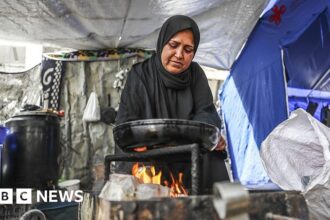When the Russian attack drones begin to swarm, the witches will come out.
The Witches of Bucha are a volunteer air defense unit that is almost entirely made up of women. They are now helping to defend Ukraine‘s skies, as more men are being sent to the frontlines.
There are also more drones that need to be shot down. They are often launched in waves from Russia to overwhelm the main defenses before a missile attack.
The women can combine their night shifts with their day jobs as teachers, physicians – and even a manicurist.
Many people say that it is a way to overcome the powerlessness they experienced when Russian forces occupied Bucha Region at the beginning of the full-scale invasion.
After Ukrainian forces liberated the area at the beginning of March 2022, horror stories about killings, torture and kidnappings began to emerge.
“I’m 51 and I weigh 100kg. I can’t run.” I thought they would send me packing but they took on!” Valentyna recalls. A veterinarian who joined the drone-busters in the summer, Valentyna now goes by the name Valkyrie.
She talks about her friends who have been deployed to the front and those who have died in combat as part of the reasons she became a teacher.
“I can do it.” “The kit is heavy, but women can handle it.”
Valentyna can demonstrate this a few hours after an air alert has been activated in the region.
Her unit flees from their base in a wood, and we follow the pickup truck as it bumps through the darkness towards the middle a field. The four-man team jumps out and begins mounting their weapons.
The machine guns are from another time: two Maxims from 1939 and ammunition boxes with red stars, from Soviet times.
Serhiy is the only man in the team and he has to pour bottled water into the ice bucket by hand.
Ukraine’s best equipment is on the frontline and it constantly asks its allies for additional supplies.
The ancient weapons have been meticulously maintained, and the Witches claim to have taken out three drones in the past summer.
Valentyna says, “My role is listening for them.” “It is a nerve-wracking job. We have to be focused and [listen] out for the slightest noise.
Inna, her friend, is also in her mid-50s and on her first deployment.
“It’s scary, yes. She laughs and tells me that her callsign is Cherry. “Because my car, not tomatoes.”
She is a maths teacher who sometimes has to rush from the woods back to a class.
“I keep all my clothes in the car.” My heels. I put some lipstick on, and teach the lesson. “Then it’s in the car again, quick change around the corner and off I go.”
“The guys are gone, but we are here.” What can’t Ukrainian woman do? “We can do anything.”
On the horizon, another group is scanning the skies for danger in their own patrol zone.
There are no publicly available statistics on the number of women in volunteer units or the total number. As Russia sends drones with explosives almost nightly, they form an additional shield around large towns and cities.
Yulia, who is in the Witches position in a large field, tracks two drones using her tablet. The drones are over the neighboring region so Bucha is not in immediate danger. However, the machine guns will remain in place until the alert is lifted.
The volunteer’s commander is a large bear, who has just returned from Pokrovsk where the fighting was fiercest in the eastern Donbass region.
Andriy verlaty, smiling, describes the scene as “non-stop fireworks”.
Around 200 men used to patrol during the nightly curfew and operate mobile air defence units throughout the Bucha area, many of whom were not fit for full military service.
Then, Ukraine rewrote its mobilization law in order to recruit more soldiers. Many of the colonel’s crew were suddenly eligible for the frontline.
“About 90% ended up in the military and another 10% scattered like rats. Col Verlaty is blunt: “We were left with almost no one.” “Just men without legs or with half a skull missing.”
He had to make a decision: fill the roles with men under mobilisation age or recruit women.
“At first, it was a joke. ‘Let’s get women!’ There was not much trust in them or in the armed services. “But that has changed,” he says.
The Witches undergo a more extensive military training on their weekends. On the day of our visit, they are learning how to storm a building. They practice in ruins of an outhouse on a farm, poking rifles around empty doorways and then edging cautiously past.
Some women are more convincing than others but their commitment and focus are clear, because they have deep and personal reasons for doing so.
“I remember the occupation. I remember the horror. Valentyna tells through small sighs, “I remember the screams from my own child.” “I remember the dead corpses, when we fled.”
Her family fled Bucha through a forest of burned tanks, soldiers and civilians. She says that at one Russian checkpoint, a soldier forced them to wind down their car window and then put a gun on her son’s forehead.
She is filled with quiet fury.
It’s why Valentyna refuses not to believe in Ukraine’s triumph, despite the gloom which has settled over her country after nearly 1,000 days of war.
“All our plans have been shattered. But I’m still here to speed up the end. “It won’t be over without us,” say our girls.
Anya, the office manager, is also a volunteer Witch. She can be seen in army boots and a rifle in hand, scuffling over broken glass in rubble, with her office manager role. She is now 52 and finds the military training empowering.
“Under occupation I felt the utter futility of my existence. I could not help anyone else or defend myself. “I wanted to learn to use weapons so I could be of some use.”
The women are having a good time. Later that night, in the woods at their base, one of them shares a chilling tale.
After Bucha was captured, Russian forces began to go house-to-house. They raped, and they killed. One day, a rumour began to spread that the occupiers would be killing the children.
This woman confides, “I will never forgive Russians for the decision I made that day.”
I won’t tell you what she said – the extreme decisions she made – but only that the soldiers didn’t come and she never had a chance to act. This woman has been haunted ever since by this moment, and by guilt.
She felt relief when she learned to defend herself, family and country.
She tells me in a quiet voice, “Coming here helped a lot.” “Because i won’t sit like a victim again and be so afraid.”
Published on 8 April
Published on 13 April 2022
* Published 4 Days Ago
Read More @ www.bbc.com













